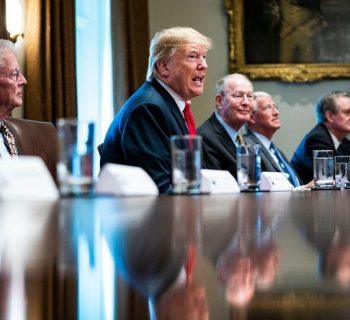By Nahal Toosi ~ Politico ~ August 8, 2018
A Trump administration debate over whether to clamp down on refugee admissions into the U.S. is forcing Secretary of State Mike Pompeo to make a tough political choice between pleasing his employees — or his boss.
President Donald Trump’s top diplomat could side with Trump and other anti-immigration hard-liners and agree to proposals that slash the number of refugees the United States admits and gut the State Department bureau that deals with them. But in doing so, he could alienate many State Department employees who strongly oppose those moves, while disappointing foreign governments unhappy that the U.S. is not doing more to deal with a global migration crisis.
Pompeo’s record as a Republican congressman suggests that he will support lowering the annual cap on refugee entries to 25,000 or less, as well as a separate proposal to downgrade his department’s refugee bureau. But advocates for more liberal refugee policies are holding out hope that he might defy expectations now that he is America’s chief diplomat with a more global perspective and bureaucratic turf to protect.
One person close to Pompeo acknowledged that dynamic, saying that while the rabble-rousing Pompeo of Congress would have “no problem” backing a sharp new limit on refugee admissions, now that he’s at the State Department, “going along with a cap that low is probably tough for him.”
An administration proposal believed to be backed by Trump adviser and immigration hard-liner Stephen Miller, and set for debate among key administration officials later this week, would slash by nearly half the current cap of 45,000 refugees who can be admitted into the U.S. per year. That ceiling was itself down from a 110,000-person cap proposed during President Barack Obama’s final months in office. The reductions come as the global migration crisis is worsening, with a record 69 million people displaced, according to the United Nations.
Lawmakers and advocates are hoping above all that Pompeo’s sense of pride will keep him from ceding authority over refugee issues — not to mention a big chunk of his budget — to others in the administration, such as the 32-year-old Miller.
But the advocates also argue that Pompeo, who has tried to win the trust of a department staff largely demoralized by his predecessor, Rex Tillerson, has an important opportunity to show that he takes seriously the views of career staffers at State, many of whom support the refugee program. They also note that Pompeo has taken nuanced positions on other sensitive issues on which he was previously a reliable conservative voice; that includes LGBT rights, where he shocked activists by tweeting out a supportive message to the LGBT community during June’s Pride Month.
“We’ve seen him evolve on some stuff,” said Noah Gottschalk, senior humanitarian policy adviser at Oxfam America State Department spokesmen and White House officials declined to answer most questions for this story, but several State staffers said they hoped Pompeo would resist the proposed changes to refugee policy. Otherwise, it “undermines the whole notion of the United States as a ‘shining city on the hill,’ which simply weakens our influence and soft power around the globe,” one senior foreign service member said.
“I sincerely hope Secretary Pompeo not only understands America’s role as the bulwark against a world in crisis, but that he is willing to be a voice of reason in the room when President Trump is told he should continue grinding the U.S. refugee program to a halt,” Sen. Robert Menendez of New Jersey, the ranking Democrat on the Senate Foreign Relations Committee, said in a statement to POLITICO.
Such hopes may well prove futile. In Congress, Pompeo supported action to ban and block funding for U.S. refugee resettlement and used rhetoric that many human rights activists consider anti-Muslim. In 2016, he co-authored a Wall Street Journal op-ed suggesting that governments should limit migration in part to preserve “their nation’s culture and character.”
Like Miller and other immigration hard-liners, Pompeo cast his past calls to restrict refugees as an issue of national security, even though advocates for refugees say they are the most heavily vetted group of people allowed to immigrate to the United States.
Pompeo has also worked hard to ingratiate himself with Trump and appears to prize his close relationship with the president, whose policies he has enthusiastically supported. “Most of us see Pompeo as more of a purer Trump loyalist than Tillerson was, so I don’t think there would be any big surprises if he went along with whatever the White House wants on this,” one State Department staffer said.
Other top administration officials who deal with immigration also appear aligned with Miller and Trump’s restrictive views.
They include White House chief of staff John Kelly, Attorney General Jeff Sessions and Kirstjen Nielsen, the Homeland Security secretary. It’s possible Defense Secretary Jim Mattis may push for keeping the refugee cap at 45,000 — the Pentagon, after all, has an interest in providing a haven to Iraqis and Afghans who have helped U.S. troops. But Mattis appears to be an increasingly marginalized figure in the administration, and he is likely to follow the State Department’s lead.
“Pompeo is the critical stakeholder,” one refugee advocate said.
Now that he’s served both as CIA director and secretary of state, activists hope that Pompeo has earned an appreciation for the diplomatic leverage having a robust refugee program can give the U.S. in negotiations with other countries.
“It’s a bargaining tool: We’ll take a certain number of refugees. These are the things you will do for us,” explained Melanie Nezer, a top official with HIAS, one of several organizations that helps refugees.
Even if Pompeo won’t — or can’t — fight the new cap, he could take a stand against a separate policy affecting refugees: proposed changes to the State Department’s Bureau of Population, Refugees and Migration. That bureau tackles issues such as providing humanitarian assistance to refugees and crafting long-term solutions to the plight of people deemed stateless.
Budget hawks within the administration, including those at the White House Office of Management and Budget, have pushed for ways to save money on humanitarian assistance, leading to discussions about whether the refugee bureau’s functions should be folded into other wings of the government, such as the U.S. Agency for International Development or the Department of Homeland Security.
Refugee advocates fear that losing the bureau will undermine the U.S. when it comes to negotiating international migration policy. The bureau’s advocates argue that migration is inherently a diplomatic matter because it involves people crossing international borders, and that the State Department must have a seat at the table.
Some also note that Pompeo would be giving up significant political power by letting go of the bureau — and ceding ground on the broader issue of immigration to Miller, who wields extraordinary influence in the White House.
“Why give away a $3.4 billion budget account that is used to address crises but also helps State wield influence with other countries and within international organizations?” asked Anne Richard, who led the refugee bureau as an assistant secretary of state under Obama.
Source: Nahal Toosi ~ Politico ~ August 8, 2018







